The Great Lakes Breast Cancer Symposium (GLBCS) was held May 2 – 4th, 2019 in Columbus Ohio. Three lobular advocates and steering committee members from LBCA participated in the symposium, which included several presentations on lobular breast cancer.
LBCA steering committee member Barbara Neilsen summarized the lobular breast cancer elements and presentations from the GLBCS from a patient advocate perspective. LBCA advocate Susan McDonald interviewed presenters Dr. Megan Kruse, Dr. Steffi Oesterreich and LBCA advocate and presenter Janice Axelrod about their conference presentations and discussed opportunities to improve research and patient care.
GLBCS ILC Presentations
The program featured two key presentations on lobular breast cancer.
Unique Biology of ILC
Steffi Oesterreich, PhD University of Pittsburgh Medical Center, LBCA Scientific Advisory Board Chair
Susan and Dr. Oesterreich discussed some of the exciting findings in the lab that could potentially lead to targeted treatments for lobular breast cancer. “We are quite excited about the hyper-activation of several growth factor receptors in ILC cells,” said Dr. Oesterreich. “For patients, the most important thing is that there are existing drugs available for growth factor receptors that (after clinical trials) could potentially be repurposed as therapies for ILC”. View the Slides. Watch the full interview.
The Genomic Landscape Of Invasive Lobular Carcinoma
Megan Kruse, MD Cleveland Clinic and Case Comprehensive Cancer Center
Susan and Dr. Kruse discussed the newly formed collaborative Great Lakes ILC Consortium. The ILC consortium is compiling data for ILC and IDC women from Case Comprehensive Cancer Center (including the Cleveland Clinic and Case Western Reserve University), UPMC, and OSU. This retrospective registry of patients treated from 1990-2017 will collect and compare basic patient demographics, tumor characteristics, co-morbidities, detailed treatment information, and outcome data from approximately 4,500 ILC cases and 36,000 IDC cases.
Dr. Kruse and Dr. Oesterreich both emphasized that the lack of analyses of large registries of patients with ILC hinders research.
“Our goal is to use this registry to answer the simple, basic questions that we already know about ductal breast cancer, but we don’t have the answers for about lobular breast cancer,” Dr. Kruse said. “This includes basic things like demographics, what the tumors look like and how they are best treated.” Watch the full interview. View Dr. Kruse’s Slides
(Because this is a retrospective study it’s not possible for patients to sign up to participate in this registry).
Patient Advocacy Presentations
A patient’s perspective of an unmet need: lobular cancer
Janice Axelrod, MD LBCA Steering Committee Member and UPMC
Susan and Janice Axelrod discussed the need for advocacy in lobular breast cancer and the goals of LBCA. “We believe ILC is different, and there should be unique treatments for lobular breast cancer,” said Dr. Axelrod. “We are working so patients have the information about their own cancer to improve their communications with their physicians. We are working with researchers to tailor studies to ILC, and to promote more research on lobular. And we want physicians to be aware of ILC to include those differences in their treatment plans for their patients to optimize care.” Watch the full interview.
About the GLBCS: The Great Lakes Breast Cancer Symposium highlighted ongoing basic, translational, clinical and population studies addressing the biological mechanisms, management and prevention of breast cancer. The symposium was hosted by Ohio State University Comprehensive Cancer Center and included researchers from participating institutions including University of Pittsburgh, Hillman Cancer Center, Case Comprehensive Cancer Center with the Cleveland Clinic, University Hospital and Case Western Reserve University, and West Virginia University Cancer Institute.
Are you a lobular breast cancer patient, caregiver or supporter who is interested in becoming an advocate? Learn more about research and education advocacy in LBCA’s advocacy toolkit.

